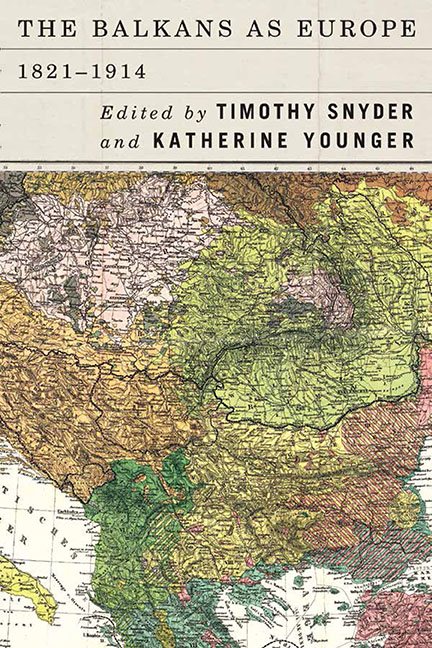Book contents
- Frontmatter
- Contents
- A Note on Terminology
- Maps
- Introduction
- 1 Balkan Initiatives to Make Europe: Two Cases from Mid-Nineteenth-Century Dalmatia
- 2 The Homeland as Terra Incognita: Geography and Bulgarian National Identity, 1830s–1870s
- 3 Liberation in Progress: Bulgarian Nationalism and Political Economy in a Balkan Perspective, 1878–1912
- 4 Emigrants and Countries of Origin: The Politics of Emigration in Southeastern Europe until the First World War
- 5 The Quiet Revolution: Consuls and the International System in the Nineteenth Century
- 6 The Hollow Crown: Civil and Military Relations during Serbia's “Golden Age,” 1903–1914
- List of Contributors
- Index
- Rochester Studies in East and Central Europe
4 - Emigrants and Countries of Origin: The Politics of Emigration in Southeastern Europe until the First World War
Published online by Cambridge University Press: 17 July 2019
- Frontmatter
- Contents
- A Note on Terminology
- Maps
- Introduction
- 1 Balkan Initiatives to Make Europe: Two Cases from Mid-Nineteenth-Century Dalmatia
- 2 The Homeland as Terra Incognita: Geography and Bulgarian National Identity, 1830s–1870s
- 3 Liberation in Progress: Bulgarian Nationalism and Political Economy in a Balkan Perspective, 1878–1912
- 4 Emigrants and Countries of Origin: The Politics of Emigration in Southeastern Europe until the First World War
- 5 The Quiet Revolution: Consuls and the International System in the Nineteenth Century
- 6 The Hollow Crown: Civil and Military Relations during Serbia's “Golden Age,” 1903–1914
- List of Contributors
- Index
- Rochester Studies in East and Central Europe
Summary
Emigration and the State
On October 4, 1913, the foreign minister of the Kingdom of Montenegro, P. Plamenić, dispatched a note to Labuda Gojnić, the interior minister:
Lately, a new wave of emigration of our citizens to America has begun. They descend in whole groups to different places in the Bay of Kotor in order to continue to Trieste. From reliable sources we have learned that most of them have no passport at all and some of them have old ones, which are not valid anymore. Our emigrants, out of all emigrants from different countries, suffer the most because they receive no protection from anywhere. They fall into the hands of speculators, who trade with them and dispatch them on the ships of the Austro-Americana [steamship line]. It would be helpful if our border authorities strictly control each emigrant's border crossing, and return those who do not have a valid passport. Moreover, all persons who are in contact with emigration agents should be monitored as closely as possible.
Writing a month later, the foreign minister expressed his suspicion that the Austrians were facilitating Montenegrin emigration:
I have learned that the Austrian border authorities use various means to facilitate Montenegrin emigration to America and are in collusion with the steamship company Austro-Americana. They distribute secret propaganda for emigration. Because of that, ever more young Montenegrins emigrate from Montenegro, which impairs our army. Small groups of Montenegrins without passports arrive in Kotor, Risan, and Budva [towns in Austrian territory] and receive documents from the Austrians for the continuation of their journey.
The Montenegrin ministers’ correspondence exemplifies the pre-1914 wave of overseas emigration from the Balkans, which became a major governmental concern across southeastern Europe. Bureaucrats from across the region felt that the movement of people across state borders constituted a problem and jeopardized salient state development goals. Governments started to worry about emigration for a number of reasons. Their main concern was that emigration would challenge one of the state's fundamental claims: that the state enjoyed sovereignty over its people. This included the expectation that citizens felt an emotional attachment to and loyalty toward their state. How could this claim be maintained if people left in order to live thousands of miles away? Was this not an embarrassment to a state that portrayed itself as the manifestation of the nation's destiny?
- Type
- Chapter
- Information
- The Balkans as Europe, 1821–1914 , pp. 78 - 109Publisher: Boydell & BrewerPrint publication year: 2018

